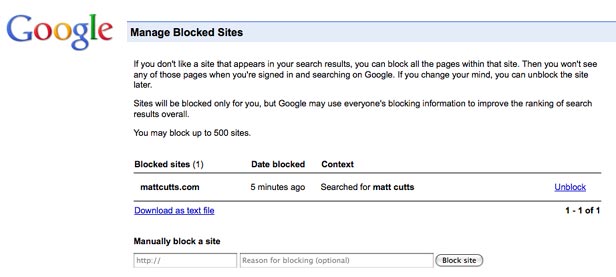Last week, Google launched a major update to its algorithm, which was positioned as one that would go after content farms. While some sites that are often attached to that label were in fact hurt by the update, some other sites that aren’t generally considered content farms became casualties as well.
Was your site impacted by Google’s algorithm update? For better or worse? Let us know.
Now, it’s important to note that Google did not come out and use the phrase “content farm” when it announced the update, but the company used language similar to what it has used in the past when talking about content farms. In a nutshell, the algorithm was supposed to be aimed at reducing rankings for lower quality content. Those who found their rankings impacted negatively are not thrilled with having their content deemed as such, and some of the sites that were apparently devalued, do raise some eyebrows.
Take, for example, Cult of Mac. This is a tech blog that covers Apple news. It is often linked to by other sources, and frequently appears on Techmeme as a source. A lot of Apple enthusiasts visit the site on a regular basis for updates. Leander Kahney, the site’s editor and publisher, wrote a scathing post about Google’s update, proclaiming, “We’ve become a civilian casualty in the war against content farms…Why us? We have no idea. The changes Google has made to its system are secret. What makes it worse is that Google’s tinkering seems to have actually improved Demand Media’s page rank, while killing ours…We’re a blog, so we aggregate news stories like everyone else. But our posts are 100% original and we do a ton of original reporting…”
“We can go toe-to-toe with any other tech news site out there,” he wrote. “We break a ton of stuff. Go take a look at MacRumors, which is very good at giving credit, and see how often we’re cited as the source of stories…Yes, we report other’s stories, just like Engadget, MacRumors, AppleInsider, Wired, Daring Fireball and everyone else. That’s the news business on the Web. It’s a flow, a conversation…The question is whether we add value — figure out what it means, if a rumor is credible, what the historical context is. We do that and we do it well. Plus we give clear credit where credit is due (unlike the original content stealers like Engadget and Mashable. Try to figure out what stories they ripped off from us).” Note: those accusations appear to have been removed from the post.
Even PRNewswire, the press release distribution service was devalued by Google’s update. Kahney also defended that site, after a commenter on his post mentioned it. He said, “…and for your information, PR newswire isn’t a content farm either. It published press releases for thousands of companies. Crappy spam websites pull releases from its RSS feeds and republish it as pretend content — which may be why it was down ranked by Google.”
Technorati got hit too. This site was once considered a darling among bloggers, and now apparently it’s been reduced to a low quality site clogging up the search results, based on Google’s doings. CEO Richard Jalichandra doesn’t appear to have acknowledged this:
Other sites more often associated with the content farm label, though they’ll pretty much all do everything they can to distance themselves from it, were also hit by the update – sites like Associated Content (run by Yahoo), Suite101, HubPages, Mahalo, EzineArticles, and others. Reports have indicated that Demand Media’s eHow – the site most often associated with the label, was actually helped by the update.
The notion that eHow was helped has been questioned. Erik Sherman at CBS looks at Compete data, and writes, “What seems to be a jump may be a normal increase, which raises the question of whether it would have been larger without the algorithm changes.”
However, if you do some searching in Google, you’ll probably notice that there is still a great deal of eHow content ranking well – and still under questionable circumstances (see “level 4 brain cancer” example discussed previously).
Still, Demand Media as a whole was not immune from the update. At least three of their sites were negatively impacted: Trails.com, Livestrong.com, and AnswerBag.com. After the update was announced, Larry Fitzgibbon, Demand Media’s EVP of Media and Operations, said: “As might be expected, a content library as diverse as ours saw some content go up and some go down in Google search results. This is consistent with what Google discussed on their blog post. It’s impossible to speculate how these or any changes made by Google impact any online business in the long term – but at this point in time, we haven’t seen a material net impact on our Content & Media business.”
Pia Chatterjee of HubPages tells us, “On our end we think that its really too soon to tell, as after any large update, all the traffic undergoes pretty serious upheaval. All these numbers will be very different in about 7/10 days. What is worrying is that the update did not seem to do what it was supposed to, which was penalize poor content. The fact that e-how has remained untouched is proof of that!”
“Our CEO, Paul Edmondson says: We are confident that over time the proven quality of our writers’ content will be attractive to users. We have faith in Google’s ability to tune results post major updates and are optimistic that the cream will rise back to the top in the coming weeks, which has been our experience with past updates.”
EzineArticles CEO Chris Knight wrote a blog post about how his site was affected, and what he is doing to try and get back up in the rankings. "While we adamantly disagree with anyone who places the ‘Content Farm’ label on EzineArticles.com, we were not immune to this algorithm change," he wrote. "Traffic was down 11.5% on Thursday and over 35% on Friday. In our life-to-date, this is the single most significant reduction in market trust we’ve experienced from Google."
To try and get back into Google’s good graces, EzineArticles is doing things like reducing the number of article submissions accepted by over 10% – rejecting articles that "are not unique enough". It will no longer accept article submissions through a WordPress Plugin. They’re reducing the number of ads per page. They’re raising the minimum article word count to 400. They’re "raising the bar" on keyword density limits. They’re removing articles considered "thin and spammy", and will put greater focus on rejection of advertorial articles. Submitted articles are required to be exclusive to the submitter (but won’t be required to be unique to EzineArticles).
Knight also considered adding a Nofollow attribute to links in the article, as “icing in the cake to further prove to Matt Cutts and Google” that they’re not trying to “game Google” or let their authors do so. Interestingly enough, Knight decided to hold off on adding Nofollow after complaints from authors.
The first author to complain, in fact, even said, “Not sure what Pollyanna planet you’re from but let me assure you, EzineArticles does not exist ‘to provide information that is beneficial to the readers.’ EzineArticles is a business, not a government organization or charity. EzineArticles was created to make its owner(s) money. There’s nothing wrong with that, but don’t fool yourself into thinking they’re a bunch of do-gooders. By the same token, the majority of us who publish on EzineArticles don’t do so to benefit readers. We too are running businesses, and EzineArticles helps our own websites get traffic and ultimately sales."
Yeah, I think Google frowns upon that whole “we’re not writing to benefit readers” thing.
Another element of this whole algorithm update is that so far, it is only active in the U.S. Once Google expands it into other countries, the sites that have seen their traffic drop off so far may be in for an even bigger shock.
By the way, there are a lot more sites impacted than those discussed in this article.
In an interview with On the Media, Google’s Matt Cutts was asked: “You have so much market share; you are so much the only game in town at this point that you can enforce these things unilaterally, without hearing or due process, putting the whole online world more or less at your mercy. Is there any process by which the people who are affected by algorithm changes and updates can make a case for themselves?”
Cutts responded:
We have a webmaster forum where you can show up and ask questions, and Google employees keep an eye on that forum. And, in fact, if you’ve been hit with a, what we call a “manual action,” there’s something called a “reconsideration request,” which essentially is an appeal that says, ah, I’m sorry that I was hiding text or doing keyword stuffing and I’ve corrected the problem, could you review this?
And over time, we’ve, I think, done more communication than any other search engine in terms of sending messages to people whose site has been hacked or who have issues and then trying to be open so that if people want to give us feedback, we listen to that.”
Cutts later said, “Any change will have some losses, but hopefully a lot more wins than losses.”
It does seem that Google may be willing to ackwowledge some errors in judgement on the matter, if this exchange between Cutts and Kahney is any indication:
I wonder how many more people will be trying to snag Cutts at SXSW.
Update: Since this article was written, Cult of Mac has seen its Google rankings return to normal. More on this here.
Were there more wins than losses with this update? How’s the search quality looking to you? Tell us what you think.
Read more of our ongoing Panda coverage:
Google Algorithm Update Fallout, eHow Response
Google Panda Update Winners, Losers, and Future Considerations
EzineArticles Hit By Google Panda Update Again
Google Panda Update Hits Demand Media’s eHow This Time
Google Panda Update Benefits Google Properties
Ranking in Google Now That Panda Has Gone Global
Google Panda Update Winners: Video, News, Blogs, and Porn
Google Panda Update Victim Xomba Loses AdSense Ads Too
Google Panda Update Officially Goes Global (In English)
Google Panda Update Launched in More Countries
Google Panda Update – Made for Big Brands?
Google Does Guest Post for Panda Victim HubPages
Examiner’s Approach to Content Quality Post Panda Update
MerchantCircle Goes From Panda Victim to Blekko Curator
More here.









